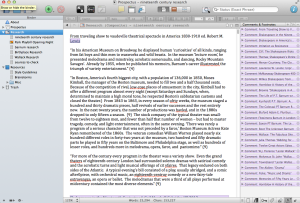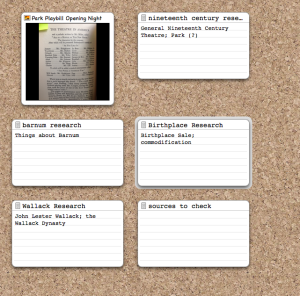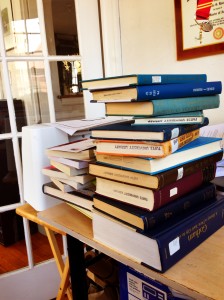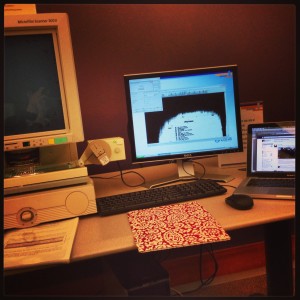As any crafter, home improver, or DIYer will tell you, having the right tool for the job makes the job a lot easier.
And, dear internet, I’ve been writing papers with the wrong tools for so long.
Basically I’ve had access to a sledgehammer and a machete when what I needed was a jeweler’s hammer and a surgeon’s scalpel. Microsoft word is many things and it’s a workhorse of a program. Basically anything you want to do you can somehow find a way to make it do. In terms of text manipulation and the actual process of word processing, it’s got many great features (tables of contents, version control, find and replace, text manipulation capabilities, etc.), but for a research paper it’s so not the tool for the job. At least, not the way I write.
Most writers are lateral thinkers. You’ve definitely heard me expound upon the beauty of lateral thinking before, so I don’t feel a need to go into it here. Basically, we (of necessity) hold many different bits of information in our mind at one time in order to forge new thoughts and ideas on the page. What this means is you’re juggling a lot of things at once: references (both bibliographic and visual), notes, facts, timelines, inspiration, and a host of your own thoughts. I work with a dual monitor set-up on a Mac, so I can keep a lot of windows open at once, but it’s often inconvenient to have to bounce back and forth between windows when the information I need could be gracefully compiled side-by-side in one place if I had the right interface for it.
Well, it turns out that they make the right interface for it. It’s called Scrivener and it’s my new best friend. While it definitely ran me a chunk of change ($45 for software is nothing to sniff at when you’re living on a grad school budget), I consider the investment worthwhile in just the last week of playing with the tool.
My best beloved turned me on to the software and introduced me to the notion. It’s apparently something that novel-writers swear by (and I can definitely see why). In fact, Scrivener is so awesome that they even offer a one-month trial version for folks participating in NaNoWriMo every year. I can’t imagine writing one large project on this and then being without it; I’m absolutely certain that the good folks at Scrivener make a ton of business that way.
I was resistant at first. It’s hard to teach an old dog new tricks, and the Scrivener help files are long and a bit arduous to get through. Scrivener will automatically open up to a tutorial upon your first usage after installs, and that tutorial will take you some time to get through. Consider it an easy-access pass to the yellow brick road; a small time investment will definitely save you in the future.
I think the best feature for me is that I can see, as I go, the accumulation of what I’ve

In center, my research notes. At right, you can see my comments; each comment is a new source. I can auto-jump to that source by clicking in to the comment.
done. If I set up my comments correctly, I can see how many sources I’ve already compiled (and in what category so I know where I’m weak without having to dig through all of my notes). Since I’m currently embroiled in preliminary Prospectus research, this is HUGE to what I’m doing right now. Additionally, I can file multiple documents in one project; my notes are thus auto-sorted as I research, and I can swap back and forth between them with extreme ease.
Another feature I absolutely love is the ability to embed images in a project. If I happen upon a broadside or picture in a reference book that I’d like to include in my notes, it’s incredibly easy to do so (I generally snap a shot with my cell phone camera, which auto-syncs to my dropbox, and then I can just drop the image into the scrivener folder and link it within the text). I don’t have to fiddle with dimensions (as in word), or worry about text wrapping or layering. The image is just there for me to look at when I need to see it.

Corkboard View of my current prospectus research
One of the selling points for me was “corkboard view”. Each document has a set of notes you can file alongside it, and when you drop into corkboard view the document is represented by an index card. You can move the index cards around with drag-and-drop to visually rearrange how your material will be presented. I can picture how wonderful this is going to be when I start drafting chapters; I can even break those chapters up into sections and drag/drop my material as I write it. As I’ve said before, I’m a tactile learner which makes the vast amount of reading/writing/research I do extremely difficult; this kind of interface really jives with my learning style and helps to de-conceptualize my writing.
Another great feature is custom meta-data tagging. Within each document, you can specify meta-data fields that can help with search functionality later. Scrivener provides a robust search interface (which really means that it will search many different parameters to find the data you’re looking for). Essentially, the more ways you label your writing, the easier it will be for you to find what you need. I can also see this coming in handy when generating an index. You know. For WAY in the future when that sort of thing is a part of my life.
On the whole, Scrivener has made me excited to write. This, as you may or may not know, is a HUGE hurdle in actually getting your work done. Experimenting with the program’s features and finding new ways to make my life easier has made dragging myself to my desk in the morning a task rather than a chore, and if there’s anything that will make life easier it’s inspiring the impetus to work. When I get going, I’m always fine (my work is fascinating and I love doing it), but climbing to my desk is an uphill battle. Scrivener has made it that much easier to ascend Everest, and it’s definitely making organization a pleasure.
I would highly recommend giving this program a shot; especially if you’re struggling with keeping your dissertation material in a format that’s not overwhelming.














